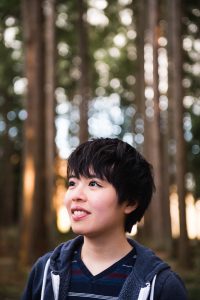Li Charmaine Anne
[mks_dropcap style=”letter” size=”52″ bg_color=”#ffffff” txt_color=”#000000″]T[/mks_dropcap]he movers had long left the new neighbours’ house, and for the last few days, silence had rushed into the space they’d carved out. Grace could hear the birds gain. Listening, she lay beneath her bedroom window in a pool of sunlight while the window’s slats beamed a crosswalk pattern across her growling, dented stomach.
“Grace! Supper!”
“Yes, Mother.” She crawled over to the slit at the bottom of her door. A box covered with a napkin slipped through it and landed with a splat on the floor. Grace lifted the napkin. Inside was a hard piece of bread, a whole cooked carrot, and a chunk of smoked ham. It smelled like heated plastic and steam, but Grace couldn’t resist digging into it with her bare hands.
But her mother was still on the other side of the door. “Grace, be quiet, girl! You want everyone in this damn house to hear? You need to be appropriate; you’re twelve, for goodness’ sake. Almost a lady now.”
Grace swallowed as softly as she could, but it was a loud dull thud clanging in her throat. “Sorry, Mother.”
But her mother tsked with disapproval. “Speaking of growing up, have you seen that brother of yours, Eli, with that girlfriend of his?”
“Not much.”
“They’ve been awfully quiet every time she’s over. In his room, with that door closed. And I swear, we’ve been running low on bread faster than ever. Faster than condoms. Do you think …” Grace imagined her mother shuddering with disgust on the other side of the door.
“Don’t worry, Mother. At school they teach us not to … you know,” Grace said.
She heard a snort from outside. “I sure hope they do! It’s how diseases get spread in the back alleys of inner cities, you know. Ugh. Anyway, hurry on and finish up.” And Grace heard a series of retreating footsteps.
Finally left in peace, Grace did her best to finish the dismal meal. It was always a challenge—eating fast, making the food disappear as quickly as possible without hurting one’s stomach—and Grace ached as she carried the empty box out for washing. When she got downstairs, her brothers—sixteen-year-old Eli and eleven-year-old Jacob—were just leaving the washing room. Grace caught Jacob wiping his mouth on his sleeve and quickly looked away. There was banging and grunting in the washing room, and when Grace got there her parents were in the middle of having sex, obviously, so Grace left her box in the sink behind her mother as quietly as she could and went back to the living room.
Eli sat down on the couch and turned on the video console while Jacob took a seat in the armchair and tucked a hand inside his fly. He’d just started learning and was obsessed with getting it right. “I better be able to play an entire round before you finish,” Eli teased. He was the cockier boy. After all, Eli was shift leader at the SugarHump, where all the popular teenagers part-timed to raise money for university and parties and whatever teenagers got up to.
Their mother had been encouraging Grace to start practising herself. “Someday all you’ll be doing is pleasin’ some man, so do as much self-pleasin’ for the time being.” She even gave Grace all the magazines she’d used when she was a preteen. So Grace tried. She genuinely did, but maybe it was because the magazines were all from the seventies and the eighties, the men’s skin all yellowed, but Grace could get no “pleasin’” from them.
But Grace didn’t want to think about naked magazine men. Truth be told, she was still hungry. But she pushed that thought out of her mind, because the moment thoughts like these seized her, a blackness swirled in her insides and it was as if everyone around stopped in their tracks, stared at her, and knew exactly the evil she was thinking about. So, shaking, she stepped out onto the veranda for fresh air. Across the street, Aunt Ruth and Uncle Joseph were happily going at it on their own veranda, skirt and trousers rumpled around their ankles. Nothing new there—
“Hello.”
Grace started. In the hedgerow bisecting her backyard and the neighbours’, a girl’s face peered through the leaves like a moon peeking through clouds. She looked Grace’s age, and had wide, green eyes with burnt brown edges, smooth creamy skin the shade of sand, and a fierce array of thick and black curly hair. Unlike most people during this time of year, she was fully clothed and wore a long, tropical-coloured dress. Something strange and foreign bubbled in Grace’s chest then. She’d never seen someone in town so beautiful. A weird thought knocked on her head: she wanted to run away into her room, dive under the covers, and without the help of her mother’s magazines—
“What’s your name?” the girl interrupted. Her dark eyebrows knitted into a frown. “Do you speak?” she asked, when Grace didn’t answer.
“Yeah,” Grace croaked. “Of course. I’m Grace. Who’re you?”
“Autumn,” said the girl, “Chandra.”
“I’ve never heard of those names,” said Grace. “They’re—they’re pretty.”
“Thanks. I have my mother’s surname, and I was born during the harvest. Hey!” She lit up with an idea. “Are you going to school on Monday?”
“Yes,” said Grace. “Of course.”
“I’m new and I don’t have any friends yet. Wanna meet up at recess?”
Grace shrugged. “I guess.” It wasn’t like she had many friends anyway. There was Melanie, but all she ever talked about was boys and the way they smelled.
Autumn beamed. “I’ll see you then, Grace.”
“See you.”
And Autumn disappeared back into the bushes.
◊ ◊ ◊
On Monday, at the lineup for school, Grace spotted Autumn straight away. She was an off-shade, colourful smudge in a sea of kids in skin. They caught each other’s eyes and Autumn waved wildly for her to join her in line. Grace did, but soon regretted her decision when the boys and girls around her whispered and cast suspicious looks.
At noon, when all the students went to the lunchrooms and locked themselves in stalls, Autumn was slowest to finish. A group of boys loitered curiously outside, and when Autumn finally came out and Grace stood up from the bench she’d been waiting on, they surrounded her. A tall boy named Silas, who always wore his father’s jean jacket and had a new temporary skull tattoo every week, took the lead. “What took you so long, Chandra?” he said. “Do they all take so long where you’re from? What the hell were you doing in there, being nasty?”
Autumn muttered something incomprehensible and pushed past them to reach Grace. “I’m actually not done yet,” she whispered to her, “but I thought I’d share.”
“Share?” Bewildered, Grace followed her, out of the school, past the playground, through the field, to the copse of pines just outside school grounds where kids sometimes traded cigarettes. It was empty today, thankfully, and when they were far enough from everyone, Autumn reached into her dress pocket and took out a fat green object Grace did not recognize. It was oddly shaped, like a voluptuous woman: narrow at the top and curved out sensually towards the bottom.
“These just ripened yesterday,” Autumn whispered. “We—Mama and I—we have a garden. I know people here aren’t that happy about this stuff, but—you don’t seem to be someone who judges, Grace, do you?” Her hot green eyes met Grace’s and widened. Grace nodded. There was nothing else to say. “Cool,” said Autumn. “So, you don’t mind if I eat it here, right? It’s just—they’re so messy and you get in trouble if you dirty the lunchrooms.”
Grace nodded again before she could think. And right before her eyes, as if she’d never heard of privacy, Autumn dug her front teeth into the object. Almost immediately, a drop of clear liquid, like sweat, ran to the tip of her chin and dripped onto the forest floor. Grace shuffled her feet away. “What is that?” she breathed.
“Oh,” said Autumn, “it’s called a Bartlett pear. They’re fruits, and they’re super delicious.” Her bite revealed a bare spot in the fruit’s flesh—it was white instead of green and it scintillated in the sun like it was made of microscopic crystal prisms. Grace stared. Autumn must have caught her doing so, because suddenly the fruit was thrust under her nose. “Do you want to try a bite?”
A bite. Her mind hesitated, but her hand reached out to accept the fruit. It was heavy and sturdy in her hand, and as she brought it to her face she could smell its ripeness. She bit into the pear where Autumn had bitten and, in the sweet haze of the flesh’s taste, couldn’t help but wonder if she was tasting something of Autumn as well. She had the sense to place her hand in front of her mouth to block what Autumn could see, but it felt unnecessary, almost weird, and so she dropped it. When she finally finished what felt like an eternity of chewing, she noticed that Autumn’s face was serious. “Listen, we need to keep this a secret,” she said. “If Mama finds out, I’ll get into a lot of trouble. But”—here Grace could see her lips fumble and her eyes dart around the forest—“I really like you, Grace. I don’t want to get you in trouble. You know that, right?”
Grace nodded.
◊ ◊ ◊
Aunt Ruth from across the street came over for a visit that evening. She and Grace’s mother sat in the living room, watching television and trading magazines. Grace sat with them, reading a book. Most of what they talked about—their husbands and the nights they spent with them—went right over her head, but then Grace heard it: “The mother works all on her own, I hear,” Aunt Ruth was saying. “She’s a consultant at the plant for a year or something. I don’t know where she’s from, but definitely far. In the cities out west, perhaps, where they—you know—have ‘dining’ rooms. Don’t think the girl even has a dad.”
At that moment, Grace felt she wanted to be anywhere but in that room, so she got up and left. No one even questioned her. She darted to the edge of the property and walked along the hedge, hoping and hoping that Autumn was on the other side. Sure enough, a face peeked out of the bushes with a smile. “I thought I heard someone.”
“What are you doing?” asked Grace.
“Tending.” When Grace didn’t seem to understand, Autumn dropped her voice: “You want to see something cool? Like, really cool? It’s a secret, though, so you can’t tell anyone. Anyone. Even your mother.” Grace didn’t want to go back home and listen to her Aunt Ruth, so she nodded. “Good!” Autumn said. She opened up a hole in the hedge with her hands, revealing a dress that was splattered with dirt, and Grace stepped in.
Grace’s own backyard was a simple bare lawn, just like all the other backyards down the street. Autumn’s, however, was hidden behind a thick blanket of hedgerow and forest that the girls had to do some stepping and weaving through. So, after enduring a battering of flyaway branches, Autumn and Grace suddenly emerged into the house’s garden, and Grace couldn’t help but let her mouth fall open. She had stepped into an alternate universe. This universe was splattered with bushels and trees of every kind, but these were not the plants Grace saw every day walking to school, like the wooded groves or the wheat fields. For one, the trees were alive, with little chickadees dancing about them, as if celebrating with a chorus of chicka-dee-dee-dee. The trees had bulbous, colourful gems drooping off them, fat and beckoning. Like Christmas decorations. She dared to walk forward and look up: she was directly underneath one of the trees, and from her eyes on the ground it was like walking into one of those ballrooms she’d read about in storybooks, the ones with ceilings hung with crystal chandeliers. There they were, the Bartlett pears from earlier in the day. She whirled around, eyes hungry for more sights. On a wall close to the house, a viney plant with bright red baubles clinging to it snaked higher than her head. And the smell. The aroma that hit her like a wall when she entered the garden was so warm. Like running into a wall, Grace was struck by the strangest, most oddly familiar desire when she saw all these colours: it rose from her stomach and simmered from a growl to a snarl; it stirred and bubbled deep in her abdomen; it was primal and uncontrollable and it filled her with so much shame her face began to prick red.
“Are you okay?” Autumn was staring at her.
“Um, yeah,” Grace said, flustered. “What’s all this … stuff?”
Autumn beamed. “This is our garden! Mama and I love gardening. It’s all we did when we lived on the coast, but the soil and sun here has been amazing for the plants. I mean, these tomatoes practically grew overnight!” She pranced over to the vines near the house and plucked one of the fat red baubles off the wall. “And they’re so sweet! We’re not making them all into marinara sauce, I don’t think. They taste so good as is.” She sank her front teeth into the bright red meat with a loud, fleshy crunch. Lips framed in pink juices, she chewed the tomato with sumptuous satisfaction. All Grace could hear was the munching sounds of tomato and teeth. She looked around the garden, trying to find a distraction. “What’s that smell?” she blurted.
“Oh.” Autumn pranced back into view. “You’re probably smelling the oregano. Here.” She motioned to a set of pots by the stairs. “Oregano is Mama’s favourite herb. I like rosemary more, but it’s too ‘savoury’ for Mama, so we tend to use oregano a lot more.” Grace clenched her sweaty palms. How could this mother and daughter talk about such things so openly?
She asked, “So, do you and your mama … do it together?” As soon as she asked this question, she regretted it. What if the question offended Autumn and her family’s ways like it would offend her own?
But Autumn just shrugged. “Mama teaches me all about prep and stuff, and we make stuff together because Mama doesn’t trust me with knives, but we eat in separate rooms most of the time.”
Something creaked behind them and Grace whirled around. A tall, beautiful woman stood at the top of the stairs, hair and skin even darker than Autumn’s. She wore a face of surprise when she saw Grace, then hurriedly drew her mouth into a line. “Autumn,” she said, her voice sticky and curt, “do we have a visitor?”
“Yes, Mama! This is Grace. She lives next door and we go to school together.”
“Next door,” Ms. Chandra said to herself before putting on a smile. “Hello, Grace. Do your parents know where you are?”
“They’re busy, ma’am, and I’ll be—I’ll be going back soon, I guess,” Grace said.
“Yes,” said Ms. Chandra. “Good.” She continued looking at the girls, her face stiff and her smile uneasy. “I bet they’re wondering where you are. Why don’t you go home for now? I’m sure you’ll see Autumn tomorrow.”
“Can’t she stay a little longer, Mama?” Autumn pleaded.
“Autumn, don’t you have homework to do?” her mother replied.
Autumn turned to Grace with a dramatic sigh and roll of the eyes. “I guess I’ll see you tomorrow, Grace.” She dropped her voice. “Mama’s being naggy. Like always.” And before Grace knew it the other girl’s arms were around her in a tight squeeze. Grace muttered a quick “see you” after that and crawled back through the hedgerows. She heard Ms. Chandra’s voice drowned out by the sticks and leaves as she crawled: “… ask me before you let anyone in our …” Grace didn’t catch the rest.
◊ ◊ ◊
School changed for Grace. When previously she’d dreaded each morning coming to another day of either teasing or isolation, now she couldn’t wait. Each day was an opportunity to sneak into the woods and learn the name of another fruit. Gala apple. Grape tomato. Asian pear. But, of course, the girls were lucky to get one day out of a week to do so. Even when the forest wasn’t occupied by the bigger, scarier girls and boys—the type to corner you when you’re late coming out of the lunchrooms—Autumn sometimes didn’t come with any fruits. Her mother was nervous, she said, and didn’t want to draw attention to their family. “We’re only here for a year. Mama’s on a contract, but I think she can’t wait to leave. She keeps saying it was a mistake to come here.”
When Grace heard this, her stomach shrank into a dark place, so she asked Autumn about the coast, which she described as a world completely alien. “There are so many more people, for one,” she said. “We’ve got almost fifty schools in the city. On one special day of the year, they teach us about food. We learn how it’s made, how to safely prepare it, what’s good for you and what’s not. Sometimes, we even talk about how to have food with other people, which is supposed to be a really good way to get to know someone—that is, if you keep everyone feeling safe and happy, of course. Kids giggle a lot, yeah; mostly the boys, because they’re so immature. I miss my old soccer coach, Mr. Santiago. He says it’s okay for women to have meals with women and men to have meals with men the same way moms and dads have meals together. Not many teachers outright say that, you know?”
Grace thought about her own school. The teachers never mentioned food, never mind who can eat with whom except the obvious, which was your parents. Since kindergarten, they’d done lessons on how food can infect the mind like a disease, firing sparks upon sparks of desire in one’s brain so that a human is rendered an animal: wild, uncontrollable, insatiable.
But surely the sweetness of a pear was worth it.
One Friday, Grace and Autumn decided to skip their last class and go biking in the woods. It was just P.E., a poor excuse for a class where the bigger kids pelted the smaller ones with dodgeballs, so the girls decided it would actually be healthier exercise to take their bikes through the forest trails and cycle all the way up the hill to see the entire town. (So technically, they weren’t skipping.) They talked non-stop about television shows, books, and music. Autumn showed off her way of riding without hands, and Grace tried to follow but almost crashed into a tree.
They reached the shoulder of the hill, left their bikes there, and hiked on foot the rest of the way, sweating heavily by the time they were at the top. They dropped onto their elbows on the grass and opened up a basket of Pink Lady apples. The entire town unrolled before them, cloaked in a late afternoon amber dust. It was fall, and the wheat farms at the edges of town were crisping into a fertile gold. Everywhere else, houses sprawled about, as if napping. If Grace squinted to the west, she could see distant blue mountain forms. And behind that—“The ocean is over there,” Autumn pointed. “I love the way it sings. It sounds like this.” She blew gently into Grace’s ear and it tickled.
“I want to visit someday,” said Grace, chuckling.
Autumn said, “You should. Come visit me when I leave.”
“Or don’t leave.” Grace curled her pinky finger around Autumn’s. It was warm and sweat-sticky from the hike. Autumn didn’t say anything. They sat like that for a while, then Grace said, “I don’t want to live here forever. I don’t believe the world’s this small.”
“It’s not,” said Autumn. Grace traced her eyes from the space between their knees to Autumn’s eyes—they were the colour of rosemary burnt at the edges. A beat of a thousand milliseconds was a thousand years. Autumn raised her eyes. Grace leaned forward and kissed her lips. She tasted the Pink Lady and lingered there for another thousand years. Autumn pulled back what seemed like way too soon, grinning, and took a giant bite out of her apple. They held each other’s gaze, eyes crinkling, before the two collapsed into a fit of giggles. They walked down the hill, hand in hand, and bumped their apples before taking a bite out of them.
“Hey!”
A group of boys emerged from the bushes—how long had they been there? Grace recognized the jean jacket. Silas. His face was gnarled into satisfied anger as the boys began to talk at once:
“Holy, they’ve been eating together. Like, in the open!”
“And, what, they’re both girls. What the hell does that even mean?”
“My daddy’s got a word for them. Calls them spitters.”
“Why spitters?”
“’Cause they eat together, which means you share a lotta spit—”
“Aw, that’s disgusting. Stop talking about … food—”
“Maybe the brown girl’s mama’s a spitter too. Makes sense if Chandra’s got no daddy.”
“They’re nasty. Go kill yourselves, spitters!”
“Yeah, go kill yourselves!”
And they descended into a round of laughter before turning around and heading back into the bushes, probably to smoke a parent’s stolen carton of cigarettes. “You better watch out Monday!” Silas yelled. “We’ll tell everyone!” His blond head was the last to sink out of sight, but just as it did, Grace was on her legs and they were moving fast. Silas turned around, a frown of surprise alighting upon his face. Grace advanced towards him, quickly now, an apple in her fist. Her nails bit into the apple’s skin. Warm fruit-blood burrowed into her nail beds. Silas thrust out his chest. “What you gonna do, weirdo?” Just a foot from him now, Grace lunged and threw the apple against Silas’s head. He cried out, cursing. “Don’t you dare tell anyone,” Grace hissed. She turned and ran, grabbing Autumn’s wrist on her way. They dashed down the rest of the hill, knees on fire, ankles in danger of twisting every step. The forest whipped into their faces. Autumn whimpered behind her; she was screaming but none of it was words in Grace’s ears because all that was there was the sound of drumming blood and drumming feet. When they got to their bikes at the bottom of the hill, they rode as fast as they could without looking back. Soon, the drumming diminished behind them, but the girls didn’t stop peddling until they reached their houses.
They’d been silent the whole ride back, not wasting oxygen on conversation, but when Grace hopped off her bike, she had the passing thought that she’d been asleep for twelve years and had only just woken up. There was a grin locked onto her face, there was delicious apple in her teeth, and she was certain she’d made a nasty boy bleed that day, the way he deserved.
“Grace.” Grace snapped out of her reverie and turned to Autumn, who was clearly not grinning. Black hair webbed across her face, and her eyes were wet and shivering. “I’m going home,” she said quietly. “You should too. Uh, goodnight.”
“Goodnight,” Grace said.
◊ ◊ ◊
The next day, Autumn was not at school. Grace didn’t think much about it. Maybe she was sick. It was November and there’d been flu going around anyway. She caught sight of Silas, who kept avoiding her eyes. There was a bruise on the side of his head. At lunchtime, Grace found him, alone, coming out of the boys’ lunchroom. She stepped in front of him, as confident as confidence could be, and lifted her chin. “You’re not opening your mouth at all, or I’ll pummel you again.”
Silas bit his lip. “You’re nasty,” he breathed.
“But I’m no tattler,” said Grace, “and I know you. You don’t grass on nobody either. And if you so much as think about it, huh, I’ll tell everyone a girl beat you to a pulp.” Silas’s face crumpled like paper. Grace tweaked the corner of her mouth into a smirk. She felt like she was running on clouds for feet.
At three o’clock when the bell rang, Grace’s knapsack was already packed. She ran out of school and down the blocks to Autumn’s house. She wormed her way through the bushes, climbed the steps, and rapped on the door. Chickadees hopped about the tomato vines, flapping and chattering in their chicka-dee-dee.
Grace waited. No answer. She knocked again. The chickadees left. The chickadees returned. Still no answer.
Her feet suddenly heavy, she walked slowly down the stairs, crawled through the bushes to her own house, and went inside. Mother was sitting with Aunt Ruth, riffling through magazines during their afternoon break. “Grace, darling,” she said without looking up. “You’re covered in filth. Go shower, will you. Here, take one of these.” She handed her a magazine. Grace didn’t look at it, just dragged herself up the stairs.
“Now where was I, Ruth? Ah, yes, she said the halfie attacked one of her boys’ friends.”
Grace froze. Slowly, she crouched down and shoved her ear between the banisters, lungs sucked in.
“Just like that? No provocation?”
“No. Well, according to Joan’s boy, one of the other boys dropped the word ‘spitter.’”
“Now I haven’t heard that one around here since Joseph’s cousin Edith ran away. Now that was nasty business.”
A break. Some more page-riffling.
“You reckon it’s true, Anne?”
“Maybe for the mother. She doesn’t have a man in that house, none that I’ve seen.”
“Well … was the girl—she was out alone, eh?”
Grace held her breath.
“As far as I know, yeah, she was just out in the woods with her face in food like it was everyone’s business. Got the boys all excited.”
Grace let go of her breath, but the darkness in her stomach dimmed tenfold.
“Now, if she was with someone … now that would be cause for expulsion, wouldn’t it?” Ruth said. “A child in the junior school like that.”
Her mother laughed, then dropped her voice darkly, in a mock-cautious way: “Now imagine if it was another girl. That would be a nightmare, wouldn’t it?”
Ruth guffawed. “Well! I wouldn’t even know what to say!”
Grace ran to her room and shut the door. She stood against it, breathing hard. Her eyes wandered to the window, towards Autumn’s house, but couldn’t see anything beyond the hedges.
Her mother and aunt were still downstairs, so Grace squirreled through her window, held on to a tree branch that was just below it, and jumped to the ground. Then, as quietly as humanly possible, she slunk to the house next door, through the bushes, and into the garden.
Except there was no garden. Only bushes and trees. Green and brown. No crimsons, scarlets, goldens, or blues. Heaps of empty soil lay forgotten about. Grace padded around slowly, refusing to understand. She made her way up the stairs, to the porch, and to the door. She opened the mailbox slot and looked inside the house. There were tables and chairs, and maybe a book lying on that armchair, but everything was too still. And there was no sound. There was no sound anywhere. She imagined a sound in her head that wasn’t there—chicka-dee-dee-dee. Somewhere in the distance, her mother and aunt erupted into howls of laughter. She closed her eyes. At least in the realm of imagination between her ears, she could hear ocean.
 Li Charmaine Anne is an undergraduate at the University of British Columbia creative writing program. She grew up, resides, and writes on unceded Coast Salish territory (otherwise known as Vancouver, BC), in the beautiful Pacific Northwest. Charmaine’s writing often involves young people discovering identity, music, board sports, and natural spaces, and she has written for Ricepaper Magazine, Discorder, and SADMag. Charmaine is passionate about diversity and representation in media, and you can find more of her writing at breakfastwithwords.wordpress.com.
Li Charmaine Anne is an undergraduate at the University of British Columbia creative writing program. She grew up, resides, and writes on unceded Coast Salish territory (otherwise known as Vancouver, BC), in the beautiful Pacific Northwest. Charmaine’s writing often involves young people discovering identity, music, board sports, and natural spaces, and she has written for Ricepaper Magazine, Discorder, and SADMag. Charmaine is passionate about diversity and representation in media, and you can find more of her writing at breakfastwithwords.wordpress.com.






